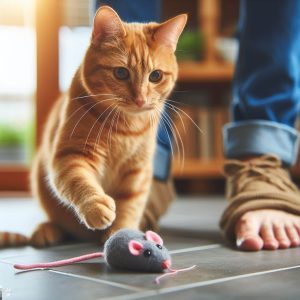Does your cat’s poop smells extremely foul, pungent and ammonia-like? You are not alone. Many cat owners complain that their feline friend’s feces smells particularly stronger and nasty.
While cats are known for their clean grooming habits, their poop often betrays that reputation. So what causes this stench, and what can cat parents do about it?
In this comprehensive guide, we will dive into the various reasons behind your cat’s terrible smelling poop and provide actionable tips to help resolve this smelly situation.
Reasons For Stinky Cat Poop
There are several potential causes of excessively stinky cat feces:
Diet and Nutrition
One of the most common reasons is diet and nutrition. The quality of your cat’s food directly impacts the smell. Cheap cat foods filled with filler ingredients like corn, wheat, soy, and by-products can lead to smelly poop. These plant-based fillers are difficult for cats to digest properly.
High protein, meat-based diets produce less smelly stools. Look for quality wet or dry foods with real animal proteins like chicken, turkey, lamb etc listed as the first few ingredients.
Tip: Gradually transition between diets over 5-7 days to avoid GI upset.
Dehydration
When cats don’t drink enough water, their poop can become more concentrated and smelly. Dry foods contain minimal moisture, so cats relying solely on kibble likely need more water.
Make sure fresh, clean water is always available. Consider adding more moisture to your cat’s diet by:
- Feeding wet food
- Adding water to dry food
- Using cat water fountains
Well-hydrated cats produce better smelling poop.
Litter Box Hygiene
Dirty and overloaded litter boxes are prime culprits for increased odor. Feces should be scooped out of the litter box daily. The entire box should be emptied, washed with mild soap, and refilled with fresh litter every 1-2 weeks.
Use unscented, clumping litter. Avoid covered boxes and plastic liners – these simply trap smells inside. Place litter boxes in low-traffic areas and keep access open. Properly cleaning litter boxes helps minimize stinky poop odors.
Health Issues
Certain medical conditions can also cause foul-smelling stool in cats:
- GI diseases: Inflammatory bowel disease, malabsorption syndrome, cancer etc.
- Infections: Bacterial, viral, fungal or parasitic infections in the gut
- Kidney disease: Toxins buildup causes breath and waste odors
- Diabetes: Unregulated blood sugar causes odd smells
- Medications: Antibiotics, dewormers etc may change stool odor
If your cat has persistently smelly poop along with other symptoms like vomiting, diarrhea, loud tummy noises, loss of appetite or weight loss, have your vet examine them for underlying illness. Treating the condition will help resolve smelly poop.
Poop Appearance
Analyze your cat’s feces in the litter box daily. Diarrhea, very soft stool, mucus, blood or anything abnormal indicates a problem.
Tip: Use a sieve when scooping litter to check poop consistency.
Don’t allow litter box avoidance due to health issues. Track any worsening of odor or change in stool volume/frequency and inform your vet promptly.
Dried Poop Stuck on Fur
Some long-haired cats may get small pieces of dried poop stuck to the fur around their rear end. This can cause lingering odor. Gently wipe with unscented pet wipes or wash just the rear with warm water to clean.
Tip: Trimming the fur around the anus can help reduce residue sticking to the skin.
Dietary and Supplement Solutions
Making dietary adjustments and trying supplements can help reduce your cat’s poop smells:
High Protein, Meat-Rich Food
Feeding your cat a protein-rich, meat-based diet is crucial for less smelly stool. Cats are obligate carnivores designed to digest animal flesh.
Some great options are:
- Wet/canned food: High moisture content and low carbs
- Raw food diet: Mimics natural feline menu
- High protein kibble: Pick grain-free options
- Freeze-dried raw: Provides nutritional benefits of raw
- Home cooked meals: Customizable with quality ingredients
Transition gradually between diets over 5-7 days. Be patient and allow 2-3 weeks to see improvement in poop smells.
Probiotics
These healthy gut bacteria support digestion and immune health. Probiotics reduce stool odor by:
- Improving nutrient absorption
- Promoting growth of good bacteria
- Inhibiting bad bacteria
- Normalizing GI transit time
Probiotic supplements are available as powders or capsules. Follow product instructions for dosage and administration. Can be used short or long term.
Digestive Enzymes
Digestive enzymes help properly break down food compounds including fats, carbohydrates, proteins and fibers. This improves digestion and absorption.
Some enzyme supplements for cats include:
- Protease – digests proteins
- Lipase – digests fats
- Amylase – digests carbs
- Cellulase – digests plant fibers
Consult your vet on appropriate digestive enzyme products for your cat.
Prebiotics
Prebiotics are non-digestible fibers that act as fuel for probiotics in the gut. They help probiotics flourish and repopulate.
Some common prebiotic supplements are inulin, fructo-oligosaccharides (FOS) and galacto-oligosaccharides. Follow label guidelines for feline products.
Gut Calmers
These compounds help soothe GI upset and reduce inflammation in the digestive tract. Ingredients like slippery elm, marshmallow root, peppermint, ginger, chamomile, lecithin etc are beneficial.
Monitor and Adjust
When trying dietary changes and supplements, allow 2-3 weeks to evaluate effects. Keep noting your cat’s poop smells and consistency.
Adjust food proportions or product dosage based on outputs. Work closely with your vet to identify optimal solutions for your cat’s needs. Be systematic and patient for best results.
Medical Solutions
If poor diet and supplements don’t resolve smelly poop, certain medical treatments may be warranted:
Medications
- Antibiotics: For bacterial overgrowth or infections causing foul stools
- Dewormers: To eliminate intestinal parasites
- Anti-inflammatories: For inflammatory bowel disease
- Other drugs: To address specific illnesses
Follow your vet’s prescribed treatment plan closely and report any side effects.
Tests and Procedures
- Fecal analysis: Checks for intestinal parasites
- Bloodwork: Evaluates organ function and disease markers
- Biopsies: Take gut tissue samples to diagnose IBD, cancer etc
- Imaging: X-rays, ultrasound etc to examine the abdomen
- Endoscopy: Inserts a camera to inspect the GI tract
Testing helps identify the underlying cause of smelly poop. Follow vet’s recommendations for needed diagnostic tests.
Veterinary Diet
Therapeutic diets formulated to improve digestion, absorb nutrients better, modify stool quality and reduce intolerances. Examples:
- Hydrolyzed protein: Highly digestible protein source
- Novel protein: New protein previously untried
- Limited ingredients: Reduces potential triggers
- High fiber: Promotes healthy motility
- Low fat: Easier digestion Strictly feed the prescribed veterinary diet. Don’t mix with other foods or treats without vet approval.
Monitor Treatment
Keep track of changes in poop smell and consistency after medical treatments. Share updates with your vet routinely. Additional medications, diet trials or tests may be needed based on response.
When to See the Vet
Consult your veterinarian if:
- Cat has persistently smelly poop for over 2 weeks
- Poop smells worsen suddenly
- Other symptoms accompany like vomiting, diarrhea, lethargy
- You see blood, mucus, worms, etc in the stool
- Litter box habits or urination change
- Appetite decreases or cat loses weight
- Cat seems ill and uncomfortable
Don’t try to just mask smelly poop with deodorizers. Determining the underlying cause with a vet is important. Cats are masters at hiding illness until it becomes severe. So don’t delay – seek help at the earliest.
Tips to Handle Stinky Litter Boxes
While working to resolve your cat’s smelly poop, these tips can help control litter box odors:
Scoop Daily
Remove all feces from the litter box daily. Leaving it longer intensifies smells.
Use Odor Control Litter
Litters with activated charcoal or baking soda help neutralize odors. Avoid scented litters – they just mask smells temporarily.
Spot Clean Accidents
Use enzyme cleaner formulated for pet stains and odors. Thoroughly clean any “misses” around the box.
Refresh Litter Frequently
Empty litter completely every 1-2 weeks and wash box. Refill with fresh litter to control smells.
Add Litter Deodorizers
Sprinkle baking soda or odor absorbing gel for extra odor control between complete litter changes.
Use Litter Box Deodorizer
Spray product inside empty litter box before refilling to keep smells at bay.
Place Near Ventilation
Ensure good airflow around the litter box. Keep it away from AC vents to prevent spreading smells throughout home.
Air Purifiers and Filters
Use HEPA air purifiers and change HVAC filters regularly to remove lingering odors.
The Takeaway
While stinky poop may seem like an inevitable part of cat parenting, there are solutions available. Identifying and addressing the cause, improving diet and hygiene, trying supplements, and using odor control tactics can help resolve this smelly issue.
Work with your trusted veterinarian to get to the bottom of your cat’s extra stinky poop. They can provide the necessary treatments and guidance to restore good digestive health and pleasant litter box aromas!
With some perseverance and detective work, you and your cat can bid farewell to those unpleasant poop smells for good. Just remember – changes take time. So be vigilant, yet patient in your approach.



